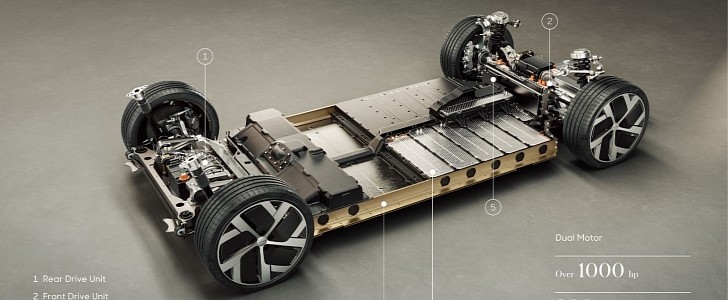Even though it might not be obvious, the Li-Ion batteries improved tremendously in the past 12 years, both in terms of volumetric density and durability. According to the Department of Energy’s Vehicle Technologies Office, the Li-Ion batteries advanced from 55 Wh per liter in 2008 to more than 450 Wh per liter in 2020. That’s an eight-fold energy-density increase in just 12 years.
We regularly write here at autoevolution about new battery technologies. Most of the time we get a mixed response from our readers, who still consider the progress non-existent and all the research, just a beautiful dream that will never come true. As impatient and disappointed people are with today’s electric vehicles’ range, a 520-mile range EV (like the Lucid Air) would’ve not been possible a few years ago.
The first-generation Nissan Leaf was launched in 2010 as a 2011 model and boasted a 24 kWh Li-Ion battery. According to DoE, Li-Ion batteries of the time had a volumetric density of 90 Wh/liter. By 2020, the value jumped to 450 Wh/liter, a 5-fold increase. This means the Lucid Air can have its 118 kWh battery occupying roughly the same space as the battery in the Nissan Leaf. For other vehicles, the battery can be made smaller, allowing them to travel the same distance while saving space, weight, and manufacturing costs.
Of course, other factors are equally important when assessing Li-Ion battery advances. The gravimetric energy density is also important, showing how much energy can be stored per weight unit. This has also improved thanks to better chemistries and packaging solutions, but the popularity of lithium ferro-phosphate batteries will probably affect the progress in this area.
In terms of durability, going back to the first-generation Nissan Leaf, we know how bad the battery degradation was. Not having a thermal management system for the battery took a heavy toll. Today’s electric vehicles fare much better in this regard, with most EV batteries lasting several hundreds of thousands of miles until they need a replacement. This is similar to how much an internal combustion engine typically lasts.
The Li-Ion batteries are far from reaching their limits though, and research continues to bring new improvements in capacity and durability. Solid-state batteries are a promising technology and newer chemistries like lithium-sulfur can further improve energy density. Expect some exciting advancements in the following years in this field.
The first-generation Nissan Leaf was launched in 2010 as a 2011 model and boasted a 24 kWh Li-Ion battery. According to DoE, Li-Ion batteries of the time had a volumetric density of 90 Wh/liter. By 2020, the value jumped to 450 Wh/liter, a 5-fold increase. This means the Lucid Air can have its 118 kWh battery occupying roughly the same space as the battery in the Nissan Leaf. For other vehicles, the battery can be made smaller, allowing them to travel the same distance while saving space, weight, and manufacturing costs.
Of course, other factors are equally important when assessing Li-Ion battery advances. The gravimetric energy density is also important, showing how much energy can be stored per weight unit. This has also improved thanks to better chemistries and packaging solutions, but the popularity of lithium ferro-phosphate batteries will probably affect the progress in this area.
In terms of durability, going back to the first-generation Nissan Leaf, we know how bad the battery degradation was. Not having a thermal management system for the battery took a heavy toll. Today’s electric vehicles fare much better in this regard, with most EV batteries lasting several hundreds of thousands of miles until they need a replacement. This is similar to how much an internal combustion engine typically lasts.
The Li-Ion batteries are far from reaching their limits though, and research continues to bring new improvements in capacity and durability. Solid-state batteries are a promising technology and newer chemistries like lithium-sulfur can further improve energy density. Expect some exciting advancements in the following years in this field.







